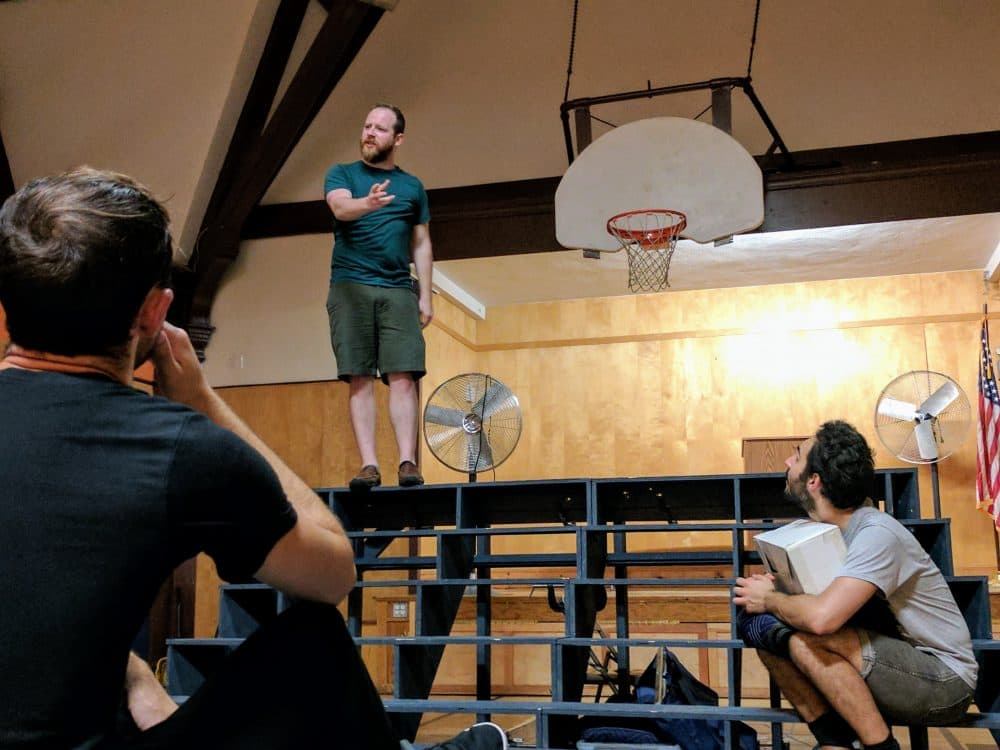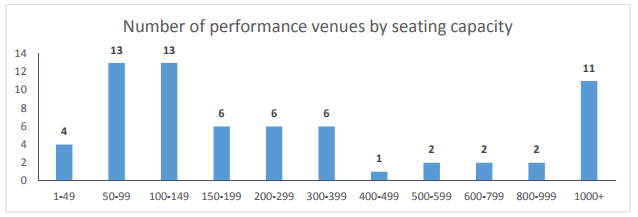Advertisement
'Now What?': Performing Arts Community Wants Solutions For Boston's Space Problem
Resume
Performing arts groups in the Boston area are frustrated by a lack of rehearsal and performance space. As some organizations are getting creative in finding alternative practice spaces, others are calling on the city to help.
A number of theater companies in Boston have struggled to find regular rehearsal space — using anything from unused lobbies, conference rooms and even MIT classrooms.
Over the summer, the Boston-based Brown Box Theatre Project rehearsed "Hamlet" at a middle school in Dorchester. The acoustics weren't great, but creative director Kyler Taustin said he felt lucky to have a reliable place for his actors to rehearse.
"Time, resources and money — when [they're drained] just to find a place to create the work, that means they're coming away from artist paychecks," Taustin said. "It means they're coming away from the budgets of the shows and going toward these other costs or this other burden that comes when you just don't know where to go."
A facilities study released in July by the Boston Planning and Development Agency, shows there's a space misalignment in the Boston arts community. Big theaters don't get a whole lot of use because most performers need medium-sized venues, with just a few hundred seats. The study showed there are only 21 venues with 150 to 600 seats. Meanwhile, artists can't afford those coveted medium-sized spaces.

"I'm not delusional to the fact that space is a cost and real estate, especially in this city, is a commodity and we have to figure out as an organization how to best cope with that," Taustin said. "But there is such high demand for space like that, that it's still hard to come by even if we did have the unlimited income."
Over the past few years, Mayor Marty Walsh has vowed to address some of the issues in Boston's arts scene — the space shortage being one of the biggest. In June of 2016, the city released Boston Creates, a 10-year cultural plan, which included steps like the facilities study. However, the space study took more than a year from the original deadline to complete. The city admits it took longer than expected, but says it wanted to be thorough.
The mayor's office is currently working with developers to build cultural spaces into future construction projects, but some artists are frustrated with what they perceive as a lack of meaningful action from the city.
"They've been working for quite some time and I'm ready for solutions," Taustin said. "There have been a lot of surveys. There have been a lot of studies. There have been a lot of talk. Now what?"
The city's assessment also showed most facilities either can’t afford to cover the costs of hosting artists or do not consider it a main goal.
Joe Spaulding, the president and CEO of the Boch Center (formerly the Citi Performing Arts Center), said his big theaters are occupied for public performances about 30 percent of the year. The Boch Center includes the 3,500-seat Wang Theatre and the 1,500-seat Shubert in Boston's theater district.
"We should be taking advantage of our existing spaces in our building and offering for the need of cultural organizations," Spaulding said.
Spaulding said he allows groups, like the Boston Theater Company, to use space in his theaters for free. And he thinks the city — through a dedicated revenue stream for the arts — should try to help theaters like his afford hosting performance groups who can't pay much.
"You have to have security, you have to have cleaning, you have to have ticketing, you have to have amenities... It has a small cost to it that right now we're happy to contribute to. But if you were looking at this in an overall plan, we ought to have a revenue source that helps to give other organizations the ability to apply to use those spaces," Spaulding said. "And we're just trying to take the lead on that."
Boston's arts czar Julie Burros recently told WBUR that the city is monitoring successes and failures of arts funding in other cities.
Denver, for example collects revenue that it uses for the arts through a small fraction of its sales tax, while Cleveland uses a cigarette excise tax. That could prove difficult in Boston. Politically, Walsh thinks it's better to take up the issue of a dedicated revenue for the arts in his second term, if he's elected in November, according to Burros.
Spaulding said the city's efforts to incorporate cultural space into future developments is a good long-term plan, but the space shortage is a problem now.
"It exists today. So let's take advantage of what we have," he said. "Let's support what we have and let's build toward the future — and that includes building a dedicated revenue source."
This article was originally published on September 01, 2017.
This segment aired on September 1, 2017.
